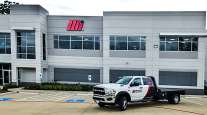Saudi Arabia Company Positions Itself for Breakbulk Growth at Port of Houston
Saudi Arabia-based Bahri, a logistics and transportation company, officially opened its Houston office March 16 as the region prepares for an uptick in drilling activity that should rejuvenate the amount of oil field equipment that crosses the Port of Houston's docks.
In industry terms, such equipment is called breakbulk cargo. These are large items that must be transported individually, such as windmill blades, instead of in containers. These types of shipments have faltered amid the drop in oil prices. Steel for oil field equipment, for instance, was down 39% last year, according to the Greater Houston Port Bureau's analysis of Census Bureau data.
"Whenever you see people running from any business, I think it's the time to enter," Bahri CEO Ibrahim Abdulrahman Al-Omar told the Chronicle.
Houston remains the country's largest port in terms of breakbulk cargo, and Al-Omar said he sees value in a local office to expand its breakbulk business.
Capt. Bill Diehl, president of the Port Bureau, agreed.
"If you're going to be in the breakbulk market, you've got to be able to service Houston," Diehl said.
And stabilizing oil prices should help the local market. Diehl expects breakbulk coming through Houston to continue improving this year. He's heard that energy companies are beginning to call manufacturers and ask about pricing for future contracts.
"We may even approach 2014 peak levels, but that remains to be seen in terms of what goes on with oil prices and energy prices in general this year," said Robert Kramp, director of research and analysis for the Texas and Oklahoma region of CBRE.
Bahri Logistics, a subsidiary of Bahri, opened its first U.S. office in Baltimore in 1992. Its main focus was shipping containers and roll-on/roll-off cargo, but the company further expanded into breakbulk four years ago with new vessels capable of carrying cargo that weighs up to 220 metric tons.
The company found that a lot of its customers had requirements or demands from the Houston and Gulf region. Bahri's new office in the Energy Corridor employs eight people but is likely to expand as Bahri grows its local footprint.
"We think this is one of the major milestones for Bahri to open in Houston," Al-Omar said.
And while the office is new, Bahri ships have called on the Port of Houston for more than 30 years. It currently has four vessels that, in a rotation, visit every 22 days. These vessels are capable of carrying breakbulk, roll-on/roll-off and container cargo, and they connect Houston to Saudi Arabia as well as to major ports in the Gulf, Indian Subcontinent and Mediterranean Sea.
The new office will mainly assist companies with exporting cargo for large construction projects to the Middle East. On the import side, it will help customers bring in project materials needed to build LNG and petrochemical facilities in the Houston area. Bahri can put such cargo on its four vessels that call on Houston, or it can charter other ships and planes.
"Looking forward, we think it's the right time actually to invest here in Houston and to have a very strong presence preparing for the boom that will come in the future," Al-Omar said.
The Saudi Arabian company was created by royal decree in 1978 with 22% owned by the Public Investment Fund of the Saudi government, 20% owned by Saudi Aramco Development Co. and the remainder owned by Saudi Nationals.
Bahri currently has a global fleet of 84 vessels, including 37 Very Large Crude Carriers, 36 chemical/product tankers, six multipurpose vessels and five dry-bulk carriers. It has 10 additional Very Large Crude Carriers on order and expects those to be delivered this year or next year.
It's also the sole transporter of the delivered sales of Saudi Aramco and the Ministry of Defense of Saudi Arabia.
After introducing its Bahri Logistics business in Houston, the company hopes to bring its Bahri Chemicals business later this year to capitalize on the region's petrochemical boom.
Kramp, with CBRE, said Bahri isn't alone in opening a Houston office. More foreign firms have been looking into Houston locations to take advantage of the petrochemical boom.
These companies may also be seeking to hedge against potential tariffs that could come from President Donald Trump's administration, Kramp said.
Later down the road, Al-Omar said, Bahri could bring its oil division here, too.
"We see Houston as a good hub, and we are here for the long term," he said.
Distributed by Tribune Content Agency, LLC



